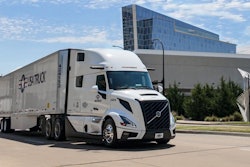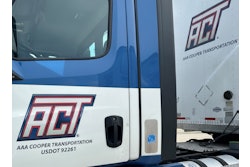It's no secret that cargo theft has skyrocketed in recent years, thanks in large part to exponential growth in strategic theft using double brokering, identity theft and other means.
A recent report from the American Transportation Research Institute dives deep into the topic of cargo theft and identifies how common it is for trucking companies across the industry and quantifies how much cargo theft costs trucking.
Contents of this video
00:00 10-44 intro; ATRI’s report on cargo theft
00:45 Five key themes of ATRI’s research on cargo theft
02:27 Percentage of motor carriers that have experienced cargo theft
04:24 Where is cargo theft happening?
06:11 How is cargo theft happening?
06:56 How much is cargo theft costing the trucking industry?
[Related: Cargo theft costs trucking $18 million per day, most loads never recovered]
Matt Cole:
How much does cargo theft really cost trucking, and where and how does it take place?
Jason Cannon:
Hey everybody. Welcome back. I'm Jason Cannon and my co-host is Matt Cole. We've been hearing for several years about how bad cargo theft is affecting the trucking and logistics industries. Reports are issued quarterly that show cargo theft trends and how they're changing. But a new study dives deep into the impacts of cargo theft on trucking companies and logistics service providers.
Matt Cole:
The American Transportation Research Institute's latest report gathered feedback from trucking companies, brokers, and three pls to find out more about how common cargo theft is from company to company, how often stolen cargo is recovered, the cost associated with theft prevention strategies and more.
Jeff Short:
We went up to a lot of folks. We started by talking to folks one-on-one in the industry. We talked to companies who had had cargo thefts. We talked to stakeholders of all kinds, including folks who try to solve those crimes, help companies figure out where the theft occurred, how to prevent it in the future. Of course, talk to carriers, and we talked to insurance folks and then we put out two surveys. The surveys went to motor carriers. The first one went to motor carriers, and the second one went to what we call logistic service providers. That would include folks providing logistics, obviously brokers three pls also, and we started to see five key themes coming out of the research. The first one would be how and where cargo theft occurs. So what techniques are used, what locations are vulnerable, what goods are targeted next, the financial costs of theft.
We started to compile numbers on what those costs were. How much does this cost the trucking industry in any given year? What might those trends be? Is it getting worse? And the answer is yes. Then cargo theft prevention strategies. We had a number of open-ended questions in the survey asking trucking companies, what do you do to protect cargo? What works? So we have a list of items that you could look through and say, alright, this might be an idea we haven't implemented yet to protect our cargo from thieves in. The fourth one would be strengthening partnerships with law enforcement. How can we work better together with law enforcement? Then finally, the role of insurance in shaping cargo theft risk management.
Jason Cannon:
The surveys primarily focused on cargo theft around 2023, but among all motor carrier respondents, only about one third said they have never had an incident of cargo theft in 2023 or otherwise.
Jason Cannon:
We were looking for everyone to respond to the survey. We weren't saying, alright, respond to the survey if you've had a cargo theft, because we want to know what kind of stuff is not stolen, and there are a lot of things out there that people don't steal. Surprisingly, we had a carrier who actually had garbage stolen from them, but I don't think anyone resold that. Probably a mistake on the part of the thieves, but for the most part, we saw about one third of our respondents saying, no, we've never had actually had a theft. 43% of respondents did have theft in 2023 and another 22% had one before 2023 at some point. So that gave us a theft group of about two thirds. It came out to 65.3% fell into the theft group. Those who had experienced the theft in 2023 or prior. So with the logistics service providers, it turned out that 100% of respondents had experienced the theft and most of those were strategic thefts. Whereas on the motor carrier side, there's still quite a bit of pilferage. About 40% of the motor carrier incidents were PIL fridge. Then the straight theft of the truck of an entire shipment, entire trailer, and then only 20% motor carriers incidents were strategic. Whereas for logistics service providers, LSPs, I'll call them, it was 62% had some level of strategic theft, fraud, redirection, double brokering, that sort of thing happen where they lost an entire load of cargo.
Matt Cole:
Jeff just talked about how thefts are most often occurring, but where are they happening?
Jason Cannon:
So at the facility level, motor carriers, and this isn't a surprise, especially with the PIL fridge being so high, their actual terminal was the highest selected. That was at 24% of thefts were from the terminal, but of course it's across the board with motor carriers. Motor carriers operate all over the place. So overnight parking locations, that was almost 20% truck stops and rest areas, customer delivery locations, customer pickup locations, even ports and remote terminals. These all ranked on the list. For LSPs, it was the customer pickup location. About more than 50%, more than half of these thefts occurred at the customer pickup location. We also asked of course about geography, where is this stuff getting stolen from? And we asked carriers to list their top five locations and we asked the LSPs to do the same. So for both, the top ranked state was California on the motor carrier side that rounded out with Illinois, Florida, Texas, and Georgia. On the LSP side, it was of course California at the top. Like I said, in then Texas, Illinois, Georgia and Florida and Tennessee had a tie. Same state, different order, and these states aren't surprising. A state like California, obviously there's a lot of freight moving in California. It's got a very large maritime port, it's got a border crossing, international border crossing. There are lots of different ways to move around stolen goods and of course move them even out of the country to sell.
Jason Cannon:
As Jeff mentioned, trucking companies own terminals ranked highest for where cargo is stumbling from carriers. How is that happening?
Jason Cannon:
We did talk to folks and especially in major cities, there is a problem, even if they've got fencing, even if they've got CCTV, guards on site, there are still instances where people will somehow get in the fence, open up trailers and go searching for goodies, if you will, to see what they can find. They don't always find something good and they will go through, look for stuff that they might be able to sell. They may break into a trailer and just leave everything because it's not something they're interested in. It's not something they can carry off. So that's a lot of what's going on at terminals.
Matt Cole:
We've heard about where and how theft is most often occurring, but there's one big question left. How much is all of this theft really costing trucking?
Jason Cannon:
What we did was we asked our respondents, what was the value of the cargo that was stolen from you? We calculated that up. We looked at how many trucks they had, what percentage of the industry, and then we expanded that outward to cover the entire industry, making assumptions based on our response rate and that sort of thing. And then we looked at some of the literature out there, what happens when something's stolen? And it's generally accepted that the costs are three to six times what the value is that is stolen. And this is all of course explained in the report, but what we ended up with for estimates was up to 6.6 billion annually is the cost to the supply chain of freight stolen from the trucking industry is quite a large number, quite substantial, and that comes out to about $18 million per day. So it's a serious problem when you look at it on a daily basis.
That's a lot of money to just disappear every single day. So there have been several studies looking into the indirect cost. This could be anything from lost sales opportunity, cost downtime. When a truck isn't moving, let's say it's been stolen, you're not making any money on it, you may be paying a lease on that truck, for instance, and you may be paying your driver, but if no freight is moving, there's a loss there. So we list many of the bigger costs to the supply chain in the report and document that, but there's a whole host of problems beyond just the value of the stolen goods. One interesting thing I actually came across was when a shipper loses goods, those goods actually compete against their product. They may go on the black market, let's say for 50% off, and they are literally competing with themselves to sell their product in place of the goods that were stolen.
Jason Cannon:
Be sure to tune back into the 10-44 next week for part two on ATRI's cargo theft report when we'll talk about prevention strategies.
That's it for this week's 10-44. You can read more on ccjdigital.com. While you're there, sign up for our newsletter and stay up to date on the latest in trucking industry news and trends. If you have any questions or feedback, please let us know in the comments below. Don't forget to subscribe and hit the bell for notifications so you can catch us again next week.










